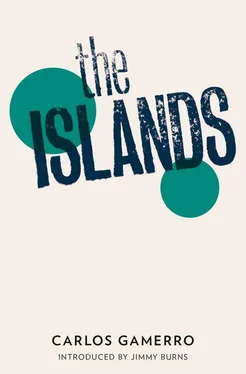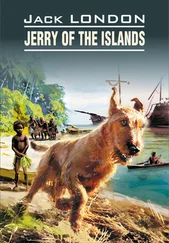‘That was the starting point of a diaspora that would cover the planet. The men born on the shores of the river, men with his colour in their skin, invisible when bathing naked in his waters, multiplied and organised. The waters of the oceans they crossed and the crystalline mountain torrents gradually washed and whitened them, bleaching their hair to yellow and their eyes to blue, until they forgot their ancestry. But the river didn’t forget, he waited: a brief wait for him — a few hundred thousand years — until the ships appeared on his back, loaded with men with white skins and yellow hair, thinking they were discovering when they were merely returning, not recognising their grandsires in the copper-skinned men with coal-black hair. The river witnessed the encounter, impassive and remote. He hasn’t changed a bit since then. His murky waters still carry the taste of the red earth, the pristine jungles, the putrefaction of the tropics, to the European city at its mouth. We built this watchtower in order to observe it; but it is he, with his patient eyes, that will see it fall. Do you see? He has all the time in the world.’
He rested the knuckles of both hands on the desk and nimbly lifted his back legs to turn and face me, his flaccid, balloon-like belly resting, along with his testicles, on the glass surface, his long simian penis overhanging the edge like a pendulum at rest.
‘I am the first Argentinian,’ he said.
‘I thought you were German,’ I answered. It was the first time I’d spoken, and I jumped at the sound of my own voice. Tamerlán dismissed my objection with a gesture.
‘We’re all Argentinians. It’s all in here,’ he said, holding up the book whose pages he’d been burning to keep warm. ‘Do you realise the genius of this man? He wanted the human race to have had its origins here, right here, in this last, forgotten corner of the planet. A bold, almost inconceivable gesture: only an Argentinian could come up with that. This man is the true father of his country.’
I moved a few steps closer to peer at the cover: The Origins of Man in the River Plate by Florentino Ameghino.
‘Do you understand? Our true homeland is the imagination. Earth and flesh are revoltingly female. Now I see the error of my ways. I wanted to build a bridge of flesh between father and son, instead of calling his name across the void. Only in it can we men engender. The void, that is the substance … That’s why the Malvinas matter so much. Now I realise my son wasn’t wrong, but continued and extended his father’s vision. He knew that only in the void of Malvinas could Argentina realise itself in its full purity. Ten years it’s taken me to understand, ten years he waited for me to understand before deciding to return.’
He’d turned his pale, darting eyes away from me and now trained them on the dead pages in the ashtray. It looked like he was talking to them.
‘You know, in some cultures the punishment for murder is to take the dead man’s place. To bang his widow, for example, and look after his kids. The murderer has to leave his old house, you understand, his wife and his children, and live the life of the dead man, the life that the dead man would have lived had he not killed him. His wife is the one who is widowed, in the end, and his children orphaned. My son César will do that very same thing for his brother. From now on, it will be as if Fausto had never left and César, never been born.’
‘Is that what happened?’ I asked disinterestedly. ‘Little Abe came back and little Cain pushed him out of the thirtieth floor?’
He nodded, smiling.
‘Can you understand my joy? My son has come back to me, at last. Everything will be the way it was before. Isn’t it wonderful, isn’t it a miracle, that a father’s love can vanquish even death?’
‘Is that why you’ve started murdering all the witnesses?’
‘I’d decided to right from the start. Come off it, Félix, don’t tell me you didn’t see it coming. Did the dollar signs stop you from seeing straight? Why do you think I paid you a hundred grand for a job that wasn’t worth ten? Your looks?’
We were now little more than two silhouettes in the half-light. The twilight had thickened round the tower as we talked and become night; the light from the monitors, like weak reflectors, was all that lit the sad simian perched on the glass, projecting across his skin a green and gold mosaic, like sunlight through forest leaves. The same information shone on all the screens: a list of twenty names that had once been twenty-six. Tamerlán scratched his groin in discomfort, then an armpit.
‘These carpets are full of fleas. That’s why I spend most of the time up here. Come over here, Félix; you can groom me as we talk.’
‘I’ve come to kill you.’
‘Yes, I know; otherwise you wouldn’t be looking at me with those big sheep eyes. Think hard about what you’re about to do; don’t regret it later.’
‘I’m protecting someone.’
He smiled as if he’d always known.
‘Of course, of course. I realised the day you came pheasant-hunting with me, when I asked you to … It never fails to amaze me that young people can go on falling in love in this …’ He made a sweeping gesture of disenchantment with his hand, despairing to define it. ‘I recognise your urges, I understand your motives, I share your reasons, but … You don’t have what it takes.’
He squatted there looking at me to see if there was any need to go on arguing or if we could move on to the next point. He decided there was still a way to go.
‘Survival, Felipe, starts out as an art, but if you don’t know how to stop, the day comes when it gets to be an addiction. You can never be sure of having survived, not completely; you always think you need a little more. So everything that appertains to life appears as dangerous, implies a risk to our chances of survival, and has to be curbed. Living becomes a means and survival its end. We’re more alike than you think, Felipe. Look at us: Darwin would be proud of us.’
That was it then; he too had realised, as I had, though he probably hadn’t made the same effort to deny it. In both of us, the same hunger that no food of this world could appease: survival at all costs. Both of us had responded in opposite, but complementary ways; the same fear of the world had led me to withdraw from it and try to cling on in its margins; and him, to swallow every last mouthful of it so that nothing was left outside to threaten him. In one of the mirrors that framed us, we were the inverted reflection of each other.
As if to afford me the freedom to decide, he’d turned his back on me and was now gazing out of the fateful window. Down there in the landfill site, one solitary last late lorry arrived with its load of rubbish and rubble, tipped it over the felled willows and headed straight for the exit, the bobbling yellow cones of its headlights lighting up the mountains of trash.
‘We’re reclaiming land from the river. Reclaiming. Ha! So much effort to buy space when what I need is time,’ he sighed, exhaling an infinite weariness. ‘If only my father had called me something inglorious like Raúl, or Roberto.’
A light, the first we’d seen, appeared on the distant shore of Uruguay. Between it and us lay nothing but an empty, black expanse.
‘The river’s very dark at night. When there’s no moon, it feels like there’s nothing more than a void in its place. It must be cold now. Cold, misty and lonely.’
‘I’m willing to let you live if you promise not to kill anyone else …’ I managed to say. It sounded so pathetic that I already felt embarrassed by mid-sentence and dried up. Tamerlán wasn’t listening though. He was still looking through his window, though there was nothing to be seen now. His eyes were turned inwards as if he’d discovered a mirror-world at the back of his skull and he was smiling, his face softer, the reflections showing something inestimable. He looked released, innocent. His voice came from the distant land on which he had once again set foot:
Читать дальше











